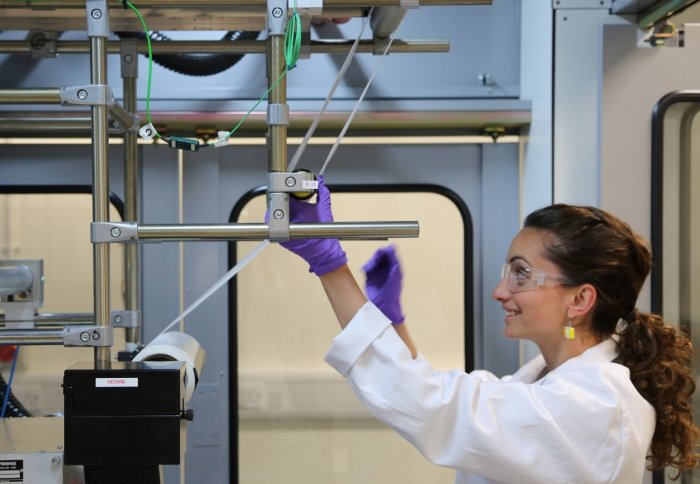
Dr. Maria Jimenez-Solomon working on her polymeric membranes

Membranes researcher scoops Henry Edward Armstrong Trust medal for outstanding research
Chemical Engineering researcher Maria Jimenez-Solomon has won the 2014 Henry Edward Armstrong Memorial Trust medal, awarded annually for outstanding research which applies scientific methods to industrial problems, for her PhD work on polymeric membranes.
The aim of Maria’s PhD project was to develop solvent-stable polymeric membranes for the purification of pharmaceutical ingredients in organic solvents. One of the drawbacks of most commercial solvent stable membranes is the poor amount of solvent able to flow through (‘flux’). To overcome this limitation she decided to carefully control the formation of the separation layer by developing thin film composite (TFC) membranes. Her first membranes performed well in water but gave no flux in organic solvents. Maria overcame this problem by adopting an unusual tactic: refusing to listen to her supervisor!
“As I kept getting these negative results for more than eight months, my supervisor encouraged me to try developing another type of membrane but I was not willing to give up,” explains Maria. “With my work I was hoping, perhaps too optimistically, to achieve a similar breakthrough for organic solvent nanofiltration than that achieved in the 90s for desalination membranes, where commercial membranes ended up being completely replaced by TFC membranes.”
“My supervisor suggested that I test my membranes in a strong swelling solvent (DMF) to assess stability. When I did so, flux was so high that everyone was convinced that the solvent had dissolved my membranes. At this point my supervisor again suggested a fresh approach. Not following his advice, I persisted and went to test my membranes in other solvents after exposing them to DMF. Surprisingly, the membrane separation performance was not affected and flux in other solvents was dramatically increased. They had up to 18 times higher solvent flux than commercial membranes without compromising selectivity. This serendipitous finding led to a significant breakthrough.”
During a proof of concept, in collaboration with GSK and Merck KGA, Maria’s TFC membranes showed better separation potential than commercial membranes, and better yield than conventional separation processes. Soon, other research groups began to replicate her innovation and implement her technique to improve flux for solvent stable TFC membranes. Industry too has become very interested in these novel membranes, licensing her invention through imperial innovations. Maria continues to work at Imperial, sponsored by membranes company Evonik, on the further development of her ideas.
“I am extremely honoured and grateful to have my research recognised in this way,” said Maria. “The Armstrong and Medal Prize is a very prestigious award and I am absolutely delighted. I would like to thank my supervisor Professor Andrew Livingston for his guidance and support throughout my PhD. Receiving this award motivates me to further succeed in my career.”
The success does not end there, with Maria also scooping this year’s Felix Weinberg Postgraduate Prize for her outstanding and original research.
Article text (excluding photos or graphics) available under an Attribution-NonCommercial-ShareAlike Creative Commons license.
Photos and graphics subject to third party copyright used with permission or © Imperial College London.
Reporter
Rayner Simpson
Department of Chemical Engineering

Contact details
Email: press.office@imperial.ac.uk
Show all stories by this author




Leave a comment
Your comment may be published, displaying your name as you provide it, unless you request otherwise. Your contact details will never be published.